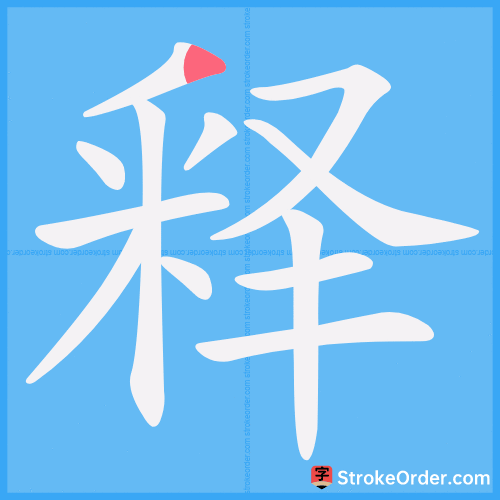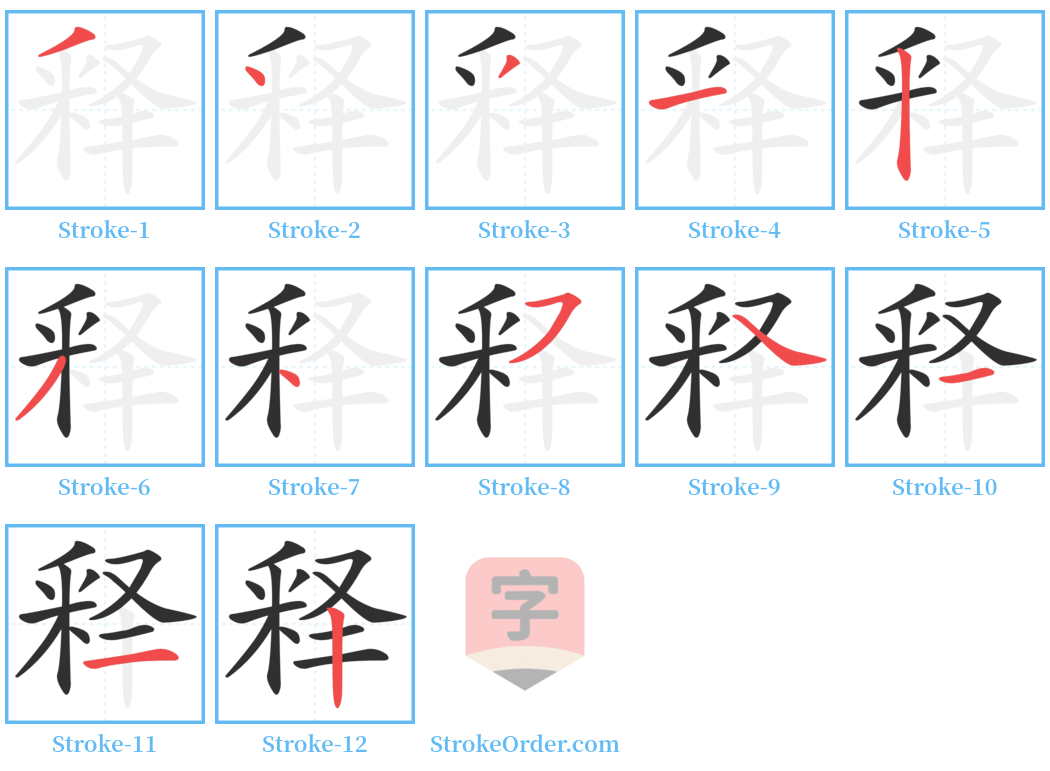释 Stroke Order
Animated Stroke Order of 释

Stroke Order Diagrams for 释

Step-by-Step Handwriting Guide for 释

Learn to Write Chinese Characters with Video Tutorials
Watch the video of writing the Chinese character "释", learn the correct stroke order (笔顺) of the character "释", and master the standard way of writing the character "释".
Free Printable Handwriting Practice with Stroke Order: 释
Printable Writing Practice Worksheet of "释" in Portrait Orientation (Tian Zi Ge)

Printable Writing Practice Worksheet of "释" in Landscape Orientation (Tian Zi Ge)

Information of 释
Pinyin
shì
Radical
采
Strokes
12 strokes
Usage
★★★★★
Definition
explain / to release
释 shì
1. 解说,说明: explain; clarify.
- 解~ (explain); 注~ (annotation); ~文 (explanatory text); ~义 (exegesis).
2. 消除,消散: eliminate; dissolve.
- ~疑 (remove doubts); ~怨 (resolve resentment); 涣然冰~ (as ice melts, all conflicts and doubts are completely eliminated).
3. 放开,放下: release; put down.
- ~放 (release); 保~ (let go); 手不~卷 (the hand does not release its grip).
4. 佛教创始人释迦牟尼的简称,后泛指佛教: an abbreviation for Sakyamuni, the founder of Buddhism; later generally refers to Buddhism.
- ~氏 (Sakyamuni); ~教 (Buddhism); ~子 (Buddhist monk); ~藏 (the complete collection of Buddhist scriptures, divided into three categories: sutras, rules, and treatises, including Chinese translations of Buddhist texts and some Chinese Buddhist writings); ~典 (classics).
释 shì
【本义】:脱掉,解下: The original meaning is to take off; unfasten.
【造字法】:形声。从采(biàn),睪(yì)声。采,有辨别、分析义: Phonetic compound, with 采 (to pick) indicating discernment and analysis.
1. 同本义: ([En.] take off; unfasten).
- 引: "释,解也。" From "Sayings," meaning "to untie."
2. 解释: ([En.] explain).
- 引: "乃使行人 奚斯释言于 齐。" He sent someone to explain.
3. 释放;赦免: ([En.] release; pardon).
- 引: "抱王竟听 郑袖,复释去 张仪。"
4. 舍弃;抛弃: ([En.] give up; abandon).
- 引: "故释先王之法,而法其所以为法。"
5. 放下;放开: ([En.] put down).
- 引: "有卖油翁释担而立。"
6. 消失: ([En.] disappear).
- 引: "虽欲爱君,惑不释也。"
7. 溶化;消融: ([En.] melt).
- 引: "涣兮其若冰之将释。"
8. 泡在水里或其他液体里: ([En.] soak).
- 引: "欲濡肉,则释而煎之以醢。"
9. 发,射出: ([En.] shoot).
- 引: "若虞机张,往省括于度,则释。"
10. 解除;免除: ([En.] remove; avoid; get rid of).
- 引: "不以一己之害为害,而使天下释其害。"
11. 淘米: ([En.] wash rice).
- 引: 《诗·大雅·生民》: "释之叟叟,烝之浮浮。"
释 shì (noun)
中国佛教用作释迦牟尼的简称 ([En:] Sakyamuni).
- 是佛陀的姓氏: It is the surname of the Buddha.
- 自东晋以后,佛教出家人自称释子,对外人而言称释氏: Since the Eastern Jin Dynasty, Buddhist monks referred to themselves as 释子, while outsiders called them 释氏.
- 如: 释厄 (the troubles experienced by Tang Seng); 释老 (referring to Sakyamuni and Laozi; Buddhism and Daoism; also called “释道”).
to interpret / to comment and explain / to annotate / to perform (i.e. interpret a theatrical role) / to decode / interpretation / annotation
to dispel (enmity, misunderstandings etc) / to vanish (of misgivings, differences of opinion) / thaw (in relations)
Input Method for 释
Pinyin
shi4
Wubi
toch|tocg
Cangjie
hdeq
Zhengma
pfxb
Four Corner
27954
Unicode
U+91ca
Same Pronunciation Characters